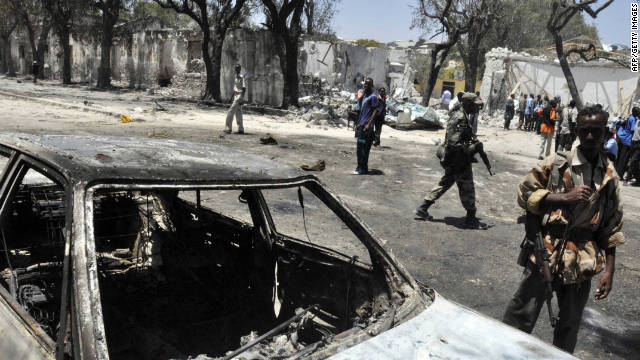
The U.N. Political Office for Somalia labeled the strike as a "vehicle-borne suicide bomb attack" that left "scores" of people dead and many others wounded.
"This is a carnage," said Col. Abdullahi Barise, a Somali police spokesman.
Al-Shabaab, an Islamist movement that has links to al Qaeda, claimed responsibility, said Somali President Sharif Ahmed, who deplored the strike and said more than 70 people were killed and 150 people were injured -- most of whom were young students.
He said "Al-Shabaab/al Qaeda" is an "enemy of the Somali people" intent "on destroying the country and any hope for its people's future." A claim of responsibility was spotted on a militant website as well.
One local journalist, Hasan Osman Abdi, who visited the scene, said he believes he saw about 100 dead. He spoke with wounded victims and other eyewitnesses who also said they believed around 100 died. Seriously injured people were being taken out of Mogadishu for treatment, a hospital official told Abdi.
Lt. Col. Paddy Nkunda, an African Union forces spokesman, initially said more than 30 people were killed. Along with the students and parents, casualties included several federal government soldiers, the African Union forces said.
Nkunda said the truck slammed into the gate of a complex containing several government ministries, including the Education Ministry, and a number of the buildings collapsed.
He said that most of those killed were students and their parents who were registering for a Turkish education program. The Somali government, which condemned the attack, said the people were waiting "for results of scholarships." It said no senior government official was hurt.
The International Committee of the Red Cross said more than 90 people injured in the blast were admitted to the city's Medina Hospital.
U.N. officials condemned the attack. "These actions are unacceptable. The murder of ordinary Somalis can not be justified for any reason," said Augustine P. Mahiga, U.N. special representative for Somalia.
Secretary-General Ban Ki-moon said he was "appalled by the vicious suicide bomb attack targeting government offices and ministries, including students at the education ministry."
"It is incomprehensible that innocents are being senselessly targeted," he said. "The attack is all the more abhorrent coming at a time when Somali political leaders, through efforts such as the recent Mogadishu conference, have been working together to chart a peaceful political future for Somalia."
Al-Shabaab is a group in Somalia that was designated as a foreign terrorist organization by the United States government in March 2008. It is waging a war against Somalia's government to implement a stricter form of Islamic law, or Sharia.
Federal and African Union forces in the impoverished and chaotic nation have battled the group for years. Many analysts believe that Al-Shabaab has been severely weakened by the African Union Mission in Somalia, targeted strikes against foreign members and the weakening of al Qaeda.
Al-Shabaab said in August that it was withdrawing from Mogadishu, and the Transitional Federal Government, backed by African Union peacekeepers, now control most districts of the capital city, the United Nations office said.
Nkunda said forces have pushed Al-Shabaab outside most of Mogadishu, but the group is still a major threat.
"They left the city, but they are now moving into asymmetrical attacks -- suicide bombings, snipers, and kidnapping and other nonconventional means," he said. "We are here to stop Al-Shabaab, so we are very concerned and we condemn this barbaric attack on innocent students and their parents."
Suicide attacks were unheard of in Somalia before 2007, but security analysts believe the attacks emerged because of the influence of foreign fighters.
Militants targeted students in December 2009, when a male suicide bomber dressed in women's clothing attacked a medical school graduation ceremony in Mogadishu.
The troubled Horn of Africa nation has been beset by human rights abuses, drought and famine, as well as fighting across the country. More than 300,000 people have been forced to flee Somalia, with many headed to refugee camps in Kenya, the office of the United Nations High Commissioner for Refugees said Tuesday.
The refugee agency said it is "very concerned" about fighting on the Somalia-Kenya border, where there have been reports of clashes between Al-Shabaab and federal forces.
Violence has occurred around the Somalia town of Dobley, a main transit point for Somalis heading to the Dadaab refugee complex in Kenya.
Mahiga also condemned Al-Shabaab's raid on Dhusamareb in central Somalia on Monday night, as well as its attack on Dobley in Lower Juba near Somalia's border with Kenya.
"Although the extremists have left the capital, it is very difficult to prevent these types of terrorist attacks, which we have consistently warned are likely to be on the increase," Mahiga said.

No comments:
Post a Comment